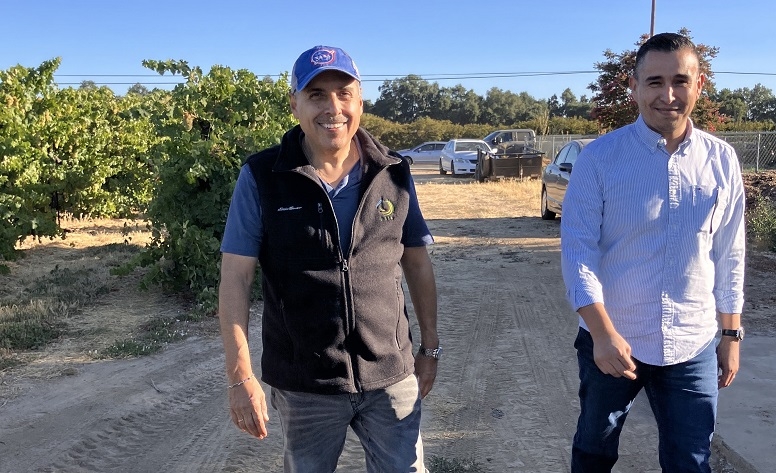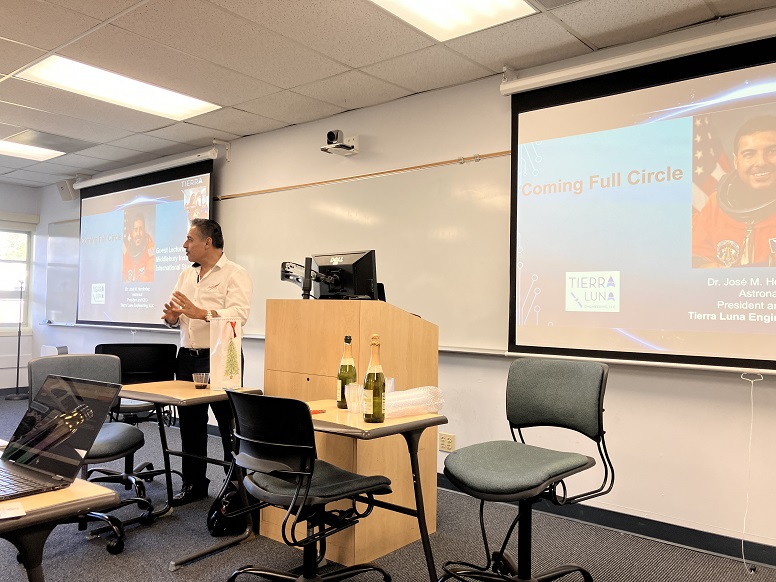How I Got Hired: Junior Localization Engineer, TransPerfect
Networking and timely followup were key in launching a career in localization, says graduate Haoyang Qin.

When former astronaut Jose Hernandez needed help with his Lodi wine label’s lift-off, he brought in a team of translation and localization management students from the Middlebury Institute.
It all started when Hernandez, owner of Tierra Luna Cellars, spoke to Professor Yelena Proskurin’s International Marketing class last spring.
“He talked about his story, the wine business, and the need for an increase in brand awareness to drive sales,” said localization student Javier Zamorano, who serves as director of multicultural marketing for the Tierra Luna Cellars project.
“[Hernandez’s needs] fit in perfectly with the lessons in the course. We proposed a marketing plan that he approved, and we have been implementing it ever since,” Zamorano said.
Most students in the localization program complete a practicum where they collaborate with real-world clients, sometimes even going on to launch their own businesses—like Zamorano.

As project lead, Zamorano manages a team of Institute students, driving marketing initiatives for Tierra Luna’s social media accounts, website, and on-ground and out-of-home (OOH) advertising. Translation student Javier Sevilla serves as the video creator and editor for the project.
“Jose’s upbringing as a farmworker and then a NASA astronaut, and how this has played a role in the development of Tierra Luna Cellars, was something he wanted to communicate through social media,” Zamorano said. “We agreed on the importance of providing all content in English and Spanish, and we have implemented this throughout the campaigns we have created, leading to a direct increase in sales for Dr. Jose Hernandez.”
Localizing goes beyond just translating content—it ensures every message is culturally aligned and deeply impactful. Zamorano oversees the work of the project’s linguist, Jesus Cabrera Solorio, a Spanish translation and interpretation student. Their partnership demonstrates how project managers, marketers, and linguists collaborate to create culturally attuned content that transcends language barriers, drives engagement, ensures that every message resonates with its intended audience, and in turn increases sales for Tierra Luna Cellars.
One of the first projects was a graduation-themed campaign. The team captured photos and videos for the posts at the Institute’s spring 2024 Commencement.
“The goal was to place the Tierra Luna Cellars bottle as a beverage to celebrate those special moments,” Zamorano said. “Our team identified the misalignment between how the wine was marketed and its price point. We redesigned the entire marketing approach from the brochure and rack cards to elevating how we describe Tierra Luna wine on social media and the website.”
Other content highlighted Hernandez’s NASA career, with titles like “Through Adversity to the Stars.” The winery has seen increased traffic to its website from these social media posts, Zamorano reported. Next the team will be working on redesigning and localizing the Tierra Luna Cellars website as well as implementing on-the-ground and OOH marketing efforts such as pop-up wine tasting rooms and restaurant partnerships.
In today’s global landscape, international marketing and localization teams are often spread across different time zones and regions, making remote work a necessity. Zamorano faces the challenge of seamlessly integrating the needs of remote team members with those who work in person at MIIS, ensuring that collaboration and communication remain fluid and effective, regardless of location. Balancing these dynamics is crucial for driving successful global campaigns while maintaining a cohesive team environment.
“We are an entirely remote team, so we are constantly in communication, brainstorming ideas and coming up with new marketing campaigns. It’s even more challenging when we start implementing ideas remotely and seeking feedback from each other,” Zamorano said.
“We have learned that we have to tailor our content to the appropriate audience, being very careful about product placement, since we are working with an alcoholic beverage company,” Zamorano said.
Middlebury Institute does a great job in preparing the students for the real-world job market.
One highlight for the team was learning about the product they’re marketing.
“I am very new to the wine industry and have been very lucky to learn directly from Dr. Hernandez. He was kind enough to give us a lesson about the winemaking process, how he started in the business, and how he plans to grow,” said Zamorano. “We have also learned about the importance of the California wine industry and how our client can differentiate himself and make a unique product.”
For Hernandez, a former NASA astronaut who grew up between California and Mexico in a farmworker family, the partnership with Middlebury Institute students is a “win-win scenario.”
“I have thoroughly enjoyed working with Professor Proskurin and her class. [They] not only showed great interest in my project to promote my wines, but also demonstrated a high level of talent,” Hernandez said. “Middlebury Institute does a great job in preparing the students for the real world job market. I am very proud to be associated with [the Institute] and see first-hand how they put to practice the concepts they learn in school.”
Networking and timely followup were key in launching a career in localization, says graduate Haoyang Qin.
| by Cissy Liu MATLM ’19
Translation and Localization Management graduate Cissy Liu shares how researching her industry and networking helped her launch a career as a localization professional in the tech industry.
| by Sarah Blackwell
The team of translation and localization students created their own Japanese version of a time travel game in just four days.